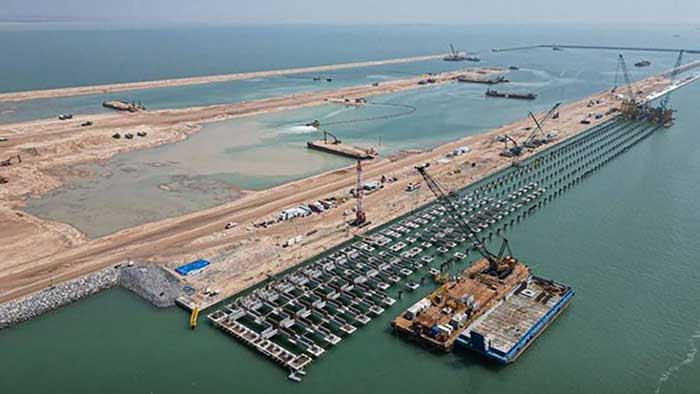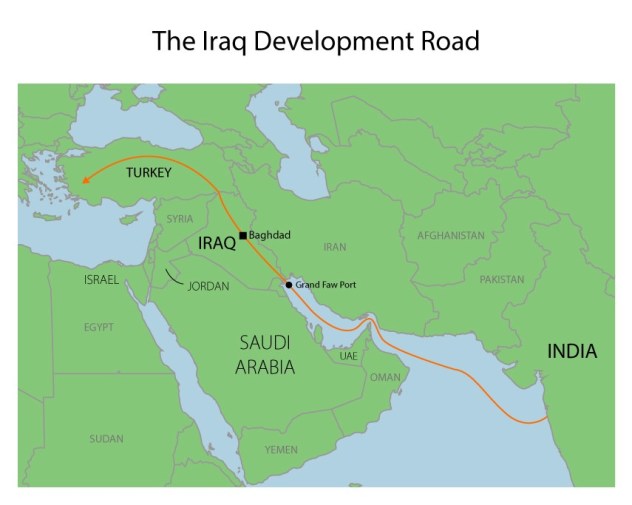Turkiye Proposes ‘Iraq Development Road’ As Alternative To The G20 Proposed ‘India-Middle-East-Europe’ Route

Development underway at the Grand Faw Port, Iraq
As we predicted in our analysis of the G20 proposed ‘India-Middle-East-Europe Corridor’ (IMAC), push back against the proposal has already begun. The Turkish President, speaking almost immediately after the G20 summit last week has stated that “There can be no corridor without Turkiye” and that “the most appropriate route for trade from east to west must pass through Turkiye”.
These comments were echoed by Hakan Fidan, the Turkish Foreign Minister, who also stated that “experts had doubts that the primary goal of IMAC was rationality and efficiency and more geostrategic concerns” were involved, adding “A trade route does not only mean meeting trade alone. It’s also a reflection of geostrategic competition.”
The IMAC route is proposed to run from India via maritime connectivity to Saudi Arabia, then cross the country west to Jordan and onto Israel for further maritime distribution to the EU. The proposal was made by the EU and interestingly, the United States at the G20 in conjunction with the countries concerned. None of the railway routes or financial requirements to build the railway currently exist, while the EU stated that ‘detailed plans’ would be released in October.
There has been scepticism not least over the apparent lack of any details of who would finance the route, although such plans would fit in with the Saudi Vision 2030 sovereign development plans, while presumably the US interest would also be in generating a return on any investment. Additional issues remain with any EU connectivity as the nearest EU ports to Israel are in Greece, whose own rail infrastructure also requires considerable upgrades.
Interestingly, the Russian President Vladimir Putin also commented on the proposed IMAC route at the recent Far Eastern Economic Forum in Vladivostok, saying that when asked about its potential:
“I think it is for our good; it will help us develop logistics. This project has been discussed for the past several years. Truth be told, the Americans joined it at the last minute. But I do not really see why they would want to be part of it, except maybe in terms of some business interest. In the meantime, the additional traffic of goods along this corridor will be in fact an addition to our North–South Transport project. We do not see anything here that could harm us in any way. Our North – South corridor goes to the Persian Gulf and then to India. If there is another route, I believe it includes Israel, we will be able to reach the Mediterranean through the Black Sea and use this corridor. But this is only a memorandum of intent so far.”
It should be noted that the first Russia-Saudi Arabia direct freight train using the North-South Corridor arrived Jeddah last month.
That is not to say that the Ankara proposed ‘Iraq Development Road’ is also without its champions, and the construction of the Iraqi ‘Grand Faw Port’, on the north-western Persian Gulf coast is already well underway. According to Razzak Al-Saadawi, Iraq’s Minister of Transport, the US$17 billion project is nearly two-thirds complete. The phase one completion date is set for 2025, including a five-berth container terminal with an initial capacity of 3.5 million teu per annum. South Korea’s Daewoo are constructing the first phase.
The port’s masterplan envisages a massive set of container, dry bulk and oil terminals with a total capacity of 99 million tons per year, as well as a dry dock and a naval base. When completed, the Grand Faw Port would be one of the largest ports in the world. It also includes rail and road links through Iraq into Turkiye and Europe, which is why President Erdogan is keen on its development.

A 36-mile road connecting to Iraq’s current Port of Umm Qasr is currently being built, while a 1,200km rail and motorway project linking the Grand Faw Port to Turkiye at the border with Iraq at the Ibrahim Khalili crossing was recently launched.
However, the financing of the route has still to be determined. Baghdad has been locked in talks with Turkiye, Iran, Syria and GCC countries for funding of the project.
This means that as things currently stand, at least four proposed routes are envisaged in connecting east and west while avoiding Russia. These include:
The existing Suez Canal;
The Middle Corridor: China, Kazakhstan, Turkiye to Europe
The India-Middle-East-Europe Corridor
The Iraq Development Road
Frankly, whichever of the three prevails in competing with the Suez Canal route will be the consortiums with the deepest pockets – with the GCC, if they back the Iraq Development Route, this is likely to prevail as the wealthiest and least geopolitically conflicted.
Chris Devonshire-Ellis is the Chairman of Dezan Shira & Associates. He can be contacted at asia@dezshira.com
Related Reading





